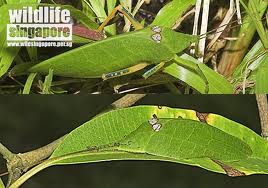by Michael Perry
SYDNEY, 6 October 2010 (Reuters) - Some 200 news species of animals and plants, including an orange spider, a jabbing spiny-legged katydid (bush cricket) and a minute long-nosed frog, have been discovered in Papua New Guinea's remote jungle-clad mountains.
A team of international scientists made the discoveries during a two-month expedition in the remote Nakanai and Muller mountains in 2009, Conservation International said on Wednesday.
 News species of katydids found in Papua New Guinea.The expedition was part of a global project to document the biodiversity of poorly known but species-rich environments and raise conservation priorities.
News species of katydids found in Papua New Guinea.The expedition was part of a global project to document the biodiversity of poorly known but species-rich environments and raise conservation priorities.
In the Nakanai mountains on New Britain island, the team found 24 new species of frogs, two new mammals, nine new species of plants, nearly 100 new insects including damselflies, katydids and ants, and approximately 100 new spiders.
Several of the katydids and at least one ant and one mammal are so different from any known species that they represent entirely new genera, said the scientists.
During one of the surveys of the Muller mountains in the Southern Highlands, the scientists camped as high as 2,875 metres (8,625 feet), discovering a katydid which, when threatened, holds its large and spiny legs above its head to jab at predators.
"We hope that news of these amazing new species will bolster the nomination of these spectacular environments for World Heritage status," team leader Stephen Richards said in a statement announcing the discoveries.
For thousands of years, PNG's steep mountain ranges and dense forests have restricted interaction between indigenous groups, creating one of the world's most culturally and linguistically diverse countries. The same geographic barriers have also limited scientific exploration.
"As we flew in to land the helicopter in a mountain meadow, zooming into this spectacular landscape, it was an incredible realisation, knowing that no scientist has ever been there before," said Richards.
Papua New Guinea's rugged terrain may be conservation's most powerful ally, said the scientists, but warned some of the country's forests were facing increasing threats from subsistence agriculture, logging and oil palm production.
"Standing on top of the Nakanai mountains, I could see oil palm plantations extending almost to the coast," said Richards.
"It struck me just how much of the lowland forest has disappeared for oil palm. The steepness of the highlands has limited their destruction, but if people start building roads, these areas will be more accessible."
More on Alert.net
Photo courtesy of Wild Singapore.